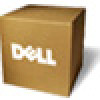Dell PowerVault 700N Dell PowerVault NAS Solution iSCSI Deployment Guide - Page 32
Disconnecting/Cleaning Up iSCSI Devices, From Initiator, From Target
 |
View all Dell PowerVault 700N manuals
Add to My Manuals
Save this manual to your list of manuals |
Page 32 highlights
Disconnecting/Cleaning Up iSCSI Devices This section describes the procedure for cleanup operations to be performed on iSCSI devices. You must perform the procedure for cleanup operations on both iSCSI Target and iSCSI Initiator. From Initiator Disconnect an active connection with the Target by stopping the iSCSI I/O operations that are running on that Target device by performing the following steps: 1 Click Start→ All Programs→ Microsoft iSCSI Initiator→ iSCSI Initiator Properties→ Targets tab. 2 Select the Target that is Connected and click Details. 3 The Target Properties screen appears. In the Sessions tab, select the check box beside the Identifier and click Logoff. The connection is disconnected. 4 In the iSCSI Initiator Properties screen, click the Persistent Targets tab and remove entries of persistent Targets. 5 If you want to remove Target IQN name entries, go to the Discovery tab and remove the IP address/DNS name of the PowerVault NAS storage system in the Target Portals section or remove the IP address/DNS name entry of the iSNS server. 6 Go to the Targets tab and click Refresh. The Target IQN name is not listed. From Target To remove virtual disks from the iSCSI Target, delete virtual disks by performing the following steps: 1 Go to PowerVault NAS Management Console→ Microsoft iSCSI Software Target→ iSCSI Targets. Select the Target and the associated virtual disks to be deleted. a The middle pane lists all virtual disks. Right-click the virtual disk to be deleted and select the Remove Virtual Disk From iSCSI Target option. b Repeat step a for all virtual disks associated with this Target. 2 To delete a Target, right-click on the Target, and select the Delete iSCSI Target option. Manually browse to locate the .vhd file associated with the Target and delete it. 32 Target Details















